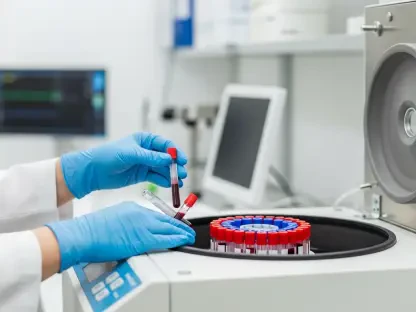The landscape of prostate cancer treatment has seen remarkable advancement in recent times, significantly enhancing survival rates and quality of life for patients dealing with advanced stages of the disease. The public revelation of former President Joe Biden’s battle with stage 4 prostate cancer has shone a light on the rigorous scientific efforts underway to manage and treat this condition effectively. Exploring the intricacies of prostate cancer, particularly the subtype known as De Novo metastatic prostate cancer, researchers and medical professionals are continually working toward improving treatment responses and patient outcomes. The developments in this field invite a discussion on current challenges, breakthroughs, and the future of prostate cancer management.
The Complexity of De Novo Metastatic Prostate Cancer
Understanding the Disease’s Nature
De Novo metastatic prostate cancer is a condition where the cancer has already spread beyond the prostate by the time of initial diagnosis. This variant tends to invade other areas, including bones and lymph nodes, resulting in an aggressive disease phase. When diagnosed, patients typically face serious prognostic scenarios. A significant marker in assessing the severity is the Gleason score, which grades cancer based on its microscopic appearance, with higher numbers indicating more aggressive forms. For instance, a score of 9 out of 10 signifies an advanced and aggressive cancer requiring fast and comprehensive intervention.
The prostate-specific antigen (PSA) test plays a crucial role in initial diagnosis and monitoring of treatment efficiency. However, its use becomes more controversial as patients age, chiefly because of the risk of false positives and unnecessary interventions. In older populations, particularly men over 70, as in Biden’s case, the test’s applicability declines since prostate cancer often progresses slow enough that individuals may die of other causes before cancer poses a lethal threat.
Challenges in Early Detection
Early detection remains one of the most challenging aspects of managing prostate cancer, especially among older men. Because symptoms are often late in manifesting, regular screenings are pivotal in catching the disease at a manageable stage. However, the PSA test, despite its utility, carries the risk of unnecessary and invasive procedures stemming from high false-positive rates, especially in seniors. The medical community debates the balance of risk versus benefit for PSA screening in the elderly, as early detection could improve life quality but also lead to potential overdiagnosis and overtreatment.
Furthermore, the slow progression of prostate cancer poses a diagnostic challenge, particularly since many older men may have indolent forms that do not affect life expectancy. Physicians must weigh such factors carefully in determining the course of action. Hence, establishing nuanced guidelines for screening and treatment is crucial to navigate these complexities. A cautious, individualized approach improves decision-making, aiming for interventions that maximize benefit while minimizing harm.
Innovations in Treatment and Management
Advances in Treatment Protocols
Recent advancements in prostate cancer treatment have transformed the outlook for patients with metastatic cases. Treatment strategies now incorporate a blend of hormone therapies, chemotherapy, and novel targeted therapies. Hormone-sensitive prostate cancer particularly benefits from therapies that suppress testosterone, a hormone that plays a pivotal role in cancer growth. These treatments, including androgen deprivation therapy, can significantly delay disease progression and extend survival.
In addition to pharmaceutical interventions, improved imaging techniques contribute to better management strategies. These innovations enable precise location and monitoring of cancer progression, facilitating tailored treatment regimens. Proton therapy, a more focused form of radiation therapy, is among the innovations that minimize damage to surrounding healthy tissues, thereby reducing side effects. Personalized treatment plans are proving successful in extending survival while maintaining patients’ quality of life, offering hope where there was once little.
Role of Research and Collaboration
Ongoing research is vital in the relentless pursuit of even better outcomes for men diagnosed with advanced prostate cancer. Research centers and institutions are concentrating on discovering new biomarkers and refining existing drugs to improve efficacy and reduce side effects. Collaborative efforts among oncologists, radiologists, and researchers play a critical role in developing comprehensive, evidence-based strategies to battle prostate cancer. These alliances yield integral insights into the genetic and molecular underpinnings of the disease, aiding in the design of novel, more effective treatments.
Public awareness and advocacy continue to drive research funding and support. Awareness campaigns and high-profile cases, such as Biden’s, underscore the importance of early screening and educated decision-making. Funding initiatives enable continuous advancements in technology and therapeutics. Through collaborations and investments in medical research, the field continuously evolves, promising improved survival rates and quality of life for prostate cancer patients worldwide.
Looking Ahead: Future Directions and Hope
The field of prostate cancer treatment has seen significant progress recently, improving the survival rates and life quality for patients, even in advanced disease stages. The public disclosure of former President Joe Biden’s fight with stage 4 prostate cancer has drawn attention to the intense scientific efforts to effectively manage and treat this illness. Researchers and medical professionals are delving into the complexities of prostate cancer, especially the subtype known as De Novo metastatic prostate cancer, with ongoing work focused on enhancing treatment responses and patient experiences. This progress opens up a conversation about the existing challenges, recent breakthroughs, and the future of managing prostate cancer. As scientists continue to develop new therapies and techniques, they aim to offer more hope and care options to those affected, highlighting the importance of continuing research and public awareness campaigns to support better outcomes for patients worldwide. The landscape is evolving, promising a brighter future for those facing this disease.









